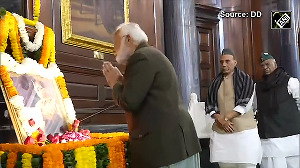Use of loudspeakers is not an essential part of any religion, the Bombay High Court said on Thursday, directing the law enforcement agencies to take prompt action against loudspeakers that violate the noise pollution norms and rules.

A division bench of Justices A S Gadkari and S C Chandak said noise was a major health hazard and no one can claim that their rights are affected in any manner if he or she is denied permission to use loudspeakers.
The HC asked the state government to direct religious institutions to adopt mechanisms for controlling noise levels, including calibrated sound systems with auto-decibel limits.
The court passed its judgment on a petition filed by two housing associations from suburban Kurla - Jaago Nehru Nagar Residents Welfare Association and Shivsrushti Co-operative Housing Societies Association Ltd - alleging police inaction against noise pollution caused by loudspeakers installed on masjids in the area.
The petitioners contended that the use of loudspeakers for religious purposes, including the recitation of 'azaan' (Islamic call to prayer) disturbed the peace and violated the Noise Pollution (Regulation and Control) Rules, 2000, as well as provisions under the Environment (Protection) Act, 1986.
The bench in its order said Mumbai was a cosmopolitan city and obviously there are persons of different religions in every part of the city.
"It is in public interest that such permissions should not be granted. By denying such permissions, rights under Article 19 or 25 of the Constitution of India are not at all infringed. Use of loudspeakers is not an essential part of any religion," the HC said.
The court said it was the "bounden duty" of the state government and other authorities to enforce the law by adopting all the necessary measures, as may be prescribed by the provisions of law.
"In a democratic State, there cannot be a situation that, a person/group of persons/association of persons would say that, it will not follow or adhere to the law of the land and the law enforcers would be meek or silent spectators to it," the judgment said.
It added that common citizens are "hapless and helpless victims of these obnoxious use of loudspeakers and/or amplifiers".
The court said the police must act on complaints against loudspeakers violating the noise pollution rules without requiring identification of the complainant to avoid such complainants being targets or ill will and developing hatred.
"We direct the State to consider to direct all the concerned to have in-built mechanism to control decibel level in their loudspeakers/voice amplifiers/public address system or other sound emitting gadgets used by any religious place/structure/institution, irrespective of religion," the bench ordered.
The State may also seriously consider to issue directions for calibration and/or auto-fixation of decibel limit of loudspeakers/voice amplifiers/public address system or other sound emitting gadgets used by any or all the religions in their respective places of prayers or worship, the HC said.
The court also directed the Commissioner of Police, Mumbai, to issue instructions to all police stations to take prompt action in case of any complaint against loudspeakers at religious places.
"We take a judicial note of the fact that, generally people/citizens do not complain about the things until it becomes intolerable and a nuisance," the bench said.
Reminding the authorities that ambient noise levels must not exceed 55 decibels during the day and 45 decibels at night in residential areas, the court added that cumulative noise from all sources must adhere to these limits.
"The law does not permit that, every individual loudspeaker will emit 55 or 45 decibels of noise aggregating to more than what is prescribed under the said Rules. That would amount to frustrating the intention of the Legislature," the court said.
The court said the police may also withdraw permissions granted to the said trusts/institutions for the use of loudspeakers, if repeated violation of the provisions of the said Noise Pollution Rules are brought to their notice.











 © 2025
© 2025